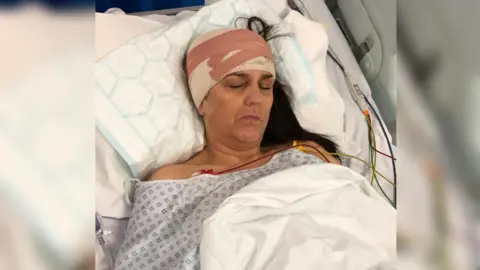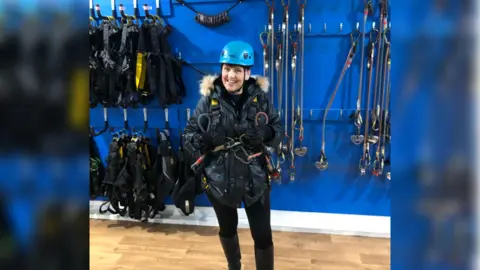'At night it was louder' - how tinnitus diagnosis revealed cancer
 Brain Tumour Research
Brain Tumour ResearchOne night Denise Wingfield noticed "a dull whirring" in her ear as she was drifting off to sleep.
Unsure what could have brought it on, she did not think too much more about it.
However, mentioning it to her friend, they advised her to go to the doctors.
Thinking it was probably just a blocked ear, she did not rush to make an appointment and had no symptoms other than the noise in her ear.
A test in October 2019 confirmed it was tinnitus, which the NHS defines as hearing noises that do not come from an outside source.
Denise, who is from Hanham, near Bristol, said: "When I tried to sleep at night it seemed louder, although it was there all the time.
"I never for a moment imagined it was caused by a brain tumour".
An MRI scan found an anomaly on her brain and two months later she underwent two operations in two days, after suffering complications in the first round of surgery.
 Brain Tumour Research
Brain Tumour ResearchDenise was diagnosed with a grade 2 oligodendroglioma and was given six weeks of radiotherapy, followed by four rounds of gruelling chemotherapy.
She has been given an "active monitoring" status, sometimes called watch and wait, where she is given a scan every six-months.
The latest scan in January confirmed, though slow growing, the tumour had increased in size, but the medical advice for her was still to wait.
"Although it's scary to know that it is still growing, I am being scanned regularly which offers some comfort," Denise said.
Despite some minor issues with balance and experiencing fatigue she said: "I've found myself wanting to live my life to the full."
 Brain Tumour Research
Brain Tumour Research"In the years since surgery, I have travelled and taken part in adrenaline-fuelled activities including a zip wire with my son from the end of Bournemouth pier to the beach," she said.
Denise, who is 55, used to work as a kitchen assistant in a care home but since her diagnosis has raised hundreds of pounds for charity.
Next month she is taking on the "200k in May Your Way" challenge in aid of Brain Tumour Research.
The challenge requires people to walk, jog, run, cycle, swim or combine these activities, to complete a 200km distance over the course of the month.
 Brain Tumour Research
Brain Tumour ResearchBrain Tumour Research says one in three people will know someone affected by a brain tumour, but that is not reflected in the funding brain cancer research receives.
"Supporting a charity that focuses on campaigning and advocates for people like me is vital," Denise said.
In the UK, 16,000 people per year are diagnosed with a brain tumour, but 1% of the national spend on cancer research has been allocated to brain tumours since records began in 2002, the charity says.
Its community development manager Louise Aubury said: "We're really grateful to Denise for her support and wish her the best of luck with her challenge".

Follow BBC Gloucestershire on Facebook, X and Instagram. Send your story ideas to us on email or via WhatsApp on 0800 313 4630.
